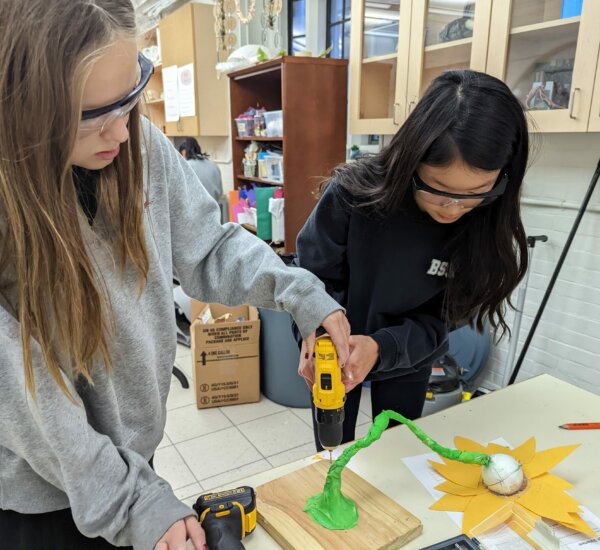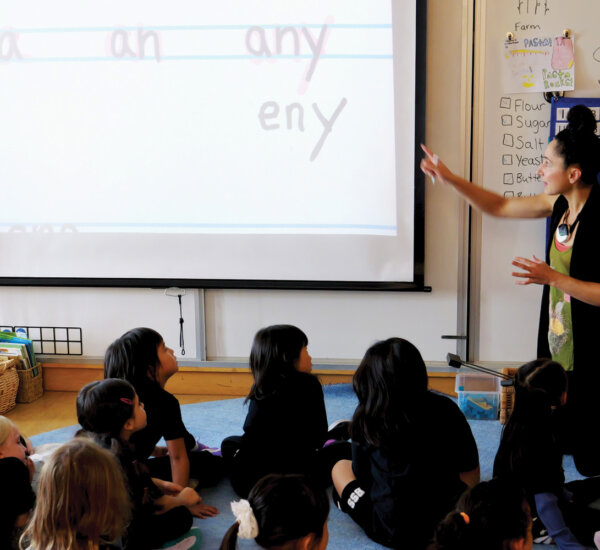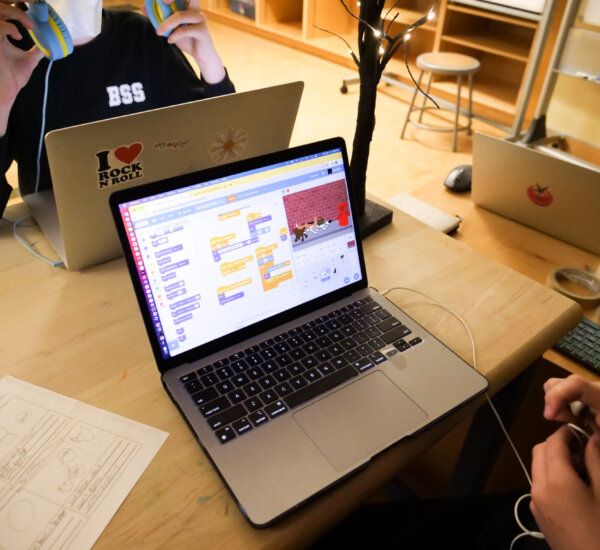Senior Kindergarteners (SK) wondered how they could support the lives of bugs after capturing and accidentally killing some insects. They observed, researched and pretended to be insects so that they could learn about the tiny creatures they wished to help. After presenting their findings, students designed an outdoor bug hotel that suited the needs of small creatures.
Curiosity guides the best learning experiences. In our Reggio-inspired Kindergarten, we move through big ideas of harmony and curiosity. Teachers provide an environment that promotes discovery, growth and development. Last fall, SK students sparked a natural interest in bugs. What do bugs need to survive? How do bugs live? Where do bugs live? It was this third guiding question that led the class to build the ultimate bug hotel for their tiny insect friends.
Ms. Jessie Sawyers and Mr. Matthew Badali say that the students’ interest in bugs began when some of the children captured potato bugs outside during free play and brought them into the classroom. Time after time, the students were disappointed to find that the creatures would be dead by morning. This led the class to wonder why the insects weren’t surviving.
The teachers encouraged learning through exploration, play and inquiry. To begin their study, students used iPads and observations of the natural world to research how they could better support the bugs’ lives. They observed that insects eat plants and live in a variety of natural structures. “Then this idea came from one of the students, Charlotte, that we needed to bring the bugs back outside and that we ultimately couldn’t support them in our classroom,” says Ms. Sawyers.
Students realized that the human-made world and the products we use for comfort don’t necessarily serve bugs the same advantages. They began to understand that bugs live in structures made of natural materials, such as clay, dirt, rocks and leaves. “They were making a lot of the homes look like houses at first,” says Ms. Sawyers. “But bugs don’t need a big square or rectangular door.”
As learning progressed, the students’ empathy for the insects grew. The class recognized that they needed to live in harmony with the natural world. Students danced like insects and drew detailed bug hotel designs. They communicated their thoughts, feelings, questions and theories to their peers and made observations. They made drawings, paintings, sculptures and prototypes to show their thinking.
The class applied their empathy toward insects to create the hotel using natural materials. They re-imagined the hotel based on their observations of what suited their residents. This winter, the Senior Kindergarten class continues to tweak their designs as their understanding of insects and habitat expands.
“Seizing an opportunity where students are truly engaged is a chance to develop skills that might be beyond grade level expectations,” says Junior School principal, Catherine Hant.
The class bug inquiry was a rich learning experience, with disciplines intertwining and connecting. Project work allowed for authentic skill development.
Students explored scientific languages through field work and by studying books. They collected samples, experimenting with materials to create structures. They tested theories, solved problems and engaged in creative and analytical thinking.
Students explored literacy by thinking critically and expressing their ideas and emotions. They began to learn how to read and write, view and represent ideas, and listen and speak about the bugs. They wrote songs, poems and told stories.
The SKs explored mathematical languages by observing numbers and patterns. They investigated the concepts, skills and processes of building, sculpting and creating structures to house their bug neighbours.
Ms. Sawyers and Mr. Badali agree that the bug hotel was an excellent organic learning opportunity. Through inquiry, students discovered skills and interests that will not only help them as they progress in science, math, writing and more in the years to come, but will also widen their perspectives in everyday encounters with nature.


